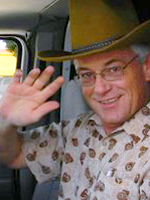Lines are blurry between dealers and grading firms
By Leon Worden
December 2006
| C |
"Traders really have to understand the grading service standards and the values," said consumer advocate and author Scott Travers, a onetime grader for Numismatic Guaranty Corp. "The trader's objective is to recognize an opportunity that will allow him to sell a coin for more money — sometimes many thousands of dollars more."
It's not a game for the novice. A resubmitted coin can easily come back with a lower grade. Travers likens it to high-stakes poker: It takes years of experience and a highly trained eye to play the game well.
One of the best, Travers writes in "The Coin Collector's Survival Manual" (2006 edition), is Jim Halperin, co-chairman of Heritage Capital Corp., whose coin auction unit, Heritage Auction Galleries, is the industry's volume leader. "Jim Halperin has been playing this game for years, and winning more than his share of hefty pots," Travers writes.
Travers notes that Halperin and co-chairman Steve Ivy collectively own approximately 25 percent of NGC — all nonvoting stock. "We have no control or influence on NGC grading or other policies," Halperin told Travers.
Direct decision-making powers notwithstanding, some observers worry about potential conflicts of interest when dealers, constantly seeking upgrades, are part-owners of grading companies such as NGC or rival Professional Coin Grading Service (PCGS), whose reputations depend on a perception of independence.
"I don't know if the grades come out any different, but the dealers get preferential treatment," American Numismatic Society Curator Robert Hoge told The Toledo Blade in May 2005, when reporters learned that embattled coin dealer Tom Noe owned stock in NGC.
According to The Blade, Noe cited his prowess at grading arbitrage when he bid on a contract to manage two rare-coin funds for the Ohio Bureau of Worker's Compensation. If hired, Noe said, he would use the strategy to generate returns — and he did, until The Blade discovered that the state's $50 million investment had gone famously wrong. In February, Noe was indicted on 53 counts of theft and related charges; in September, he was sentenced to 27 months in federal prison for laundering money to President Bush's reelection campaign.
When inspectors seized Noe's remaining coins, they found some of them "in the same building and suite" as NGC headquarters in Florida, The Blade reported. Noe's trial in the so-called Coingate affair was slated to start in October.
NGC flat-out forbids its graders from doubling as coin dealers. While "all were coin dealers at some time in their careers," giving them the necessary experience in "market standards" for coin grading, "NGC's full-time graders cannot be involved in the commercial buying and selling of coins," the company states on its Web site. The site is silent on rules for contract or part-time graders.
"The need for full-time graders to be prohibited from buying and selling coins is a policy not adhered to by all coin grading services, but it's a firm rule at NGC."
The comment is an apparent swipe at PCGS, whose official "conflict of interest rules" don't bar graders from selling coins independently.
"Full-time graders and authenticators are prohibited from submitting items to our company for grading and authentication," PCGS states. When PCGS hires "outside consultants" to help in grading, they can't grade or authenticate "any item in which they have a financial interest."
"There would be a conflict of interest if I were a grader, which I am not, and if I graded my own coins, which I don't," said David Hall, founder of PCGS and president of its parent company, Collectors Universe. Hall owns a separate coin dealership, David Hall Rare Coins, in office space he leases from Collectors Universe in Newport Beach, California. The president of Hall's dealership is another Collectors Universe founder and director, Van Simmons.
"We don't submit coins we own," Hall said. "I have this other coin company that buys and sells coins, but it buys coins that are already graded by PCGS from other dealers who got them graded."
PCGS President Ron Guth also operates a separate retail coin business.
©2006, MILLER MAGAZINES INC./LEON WORDEN. RIGHTS RESERVED.

